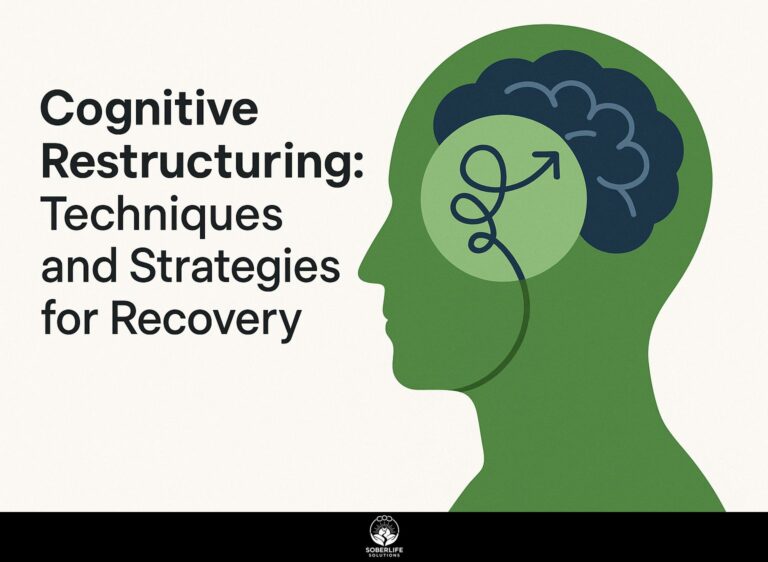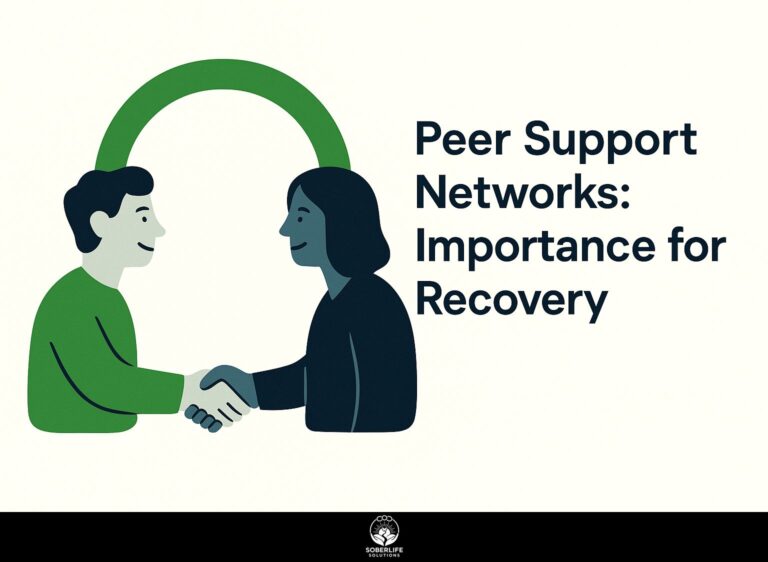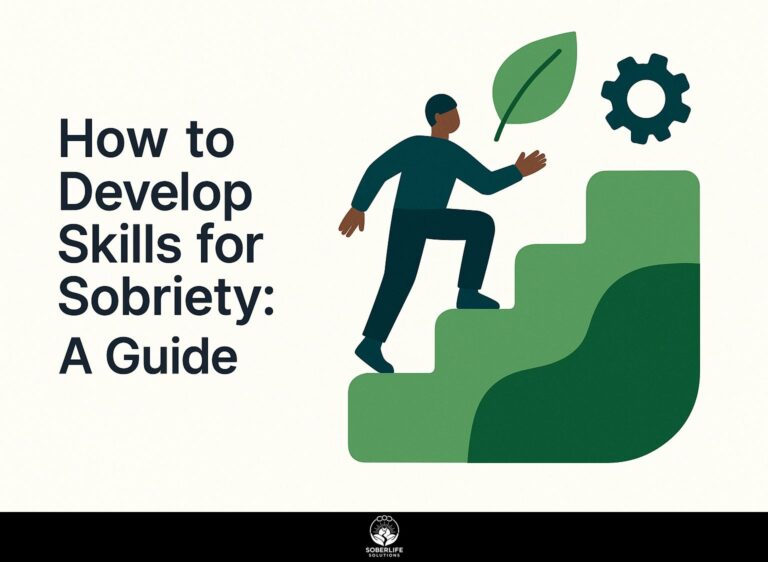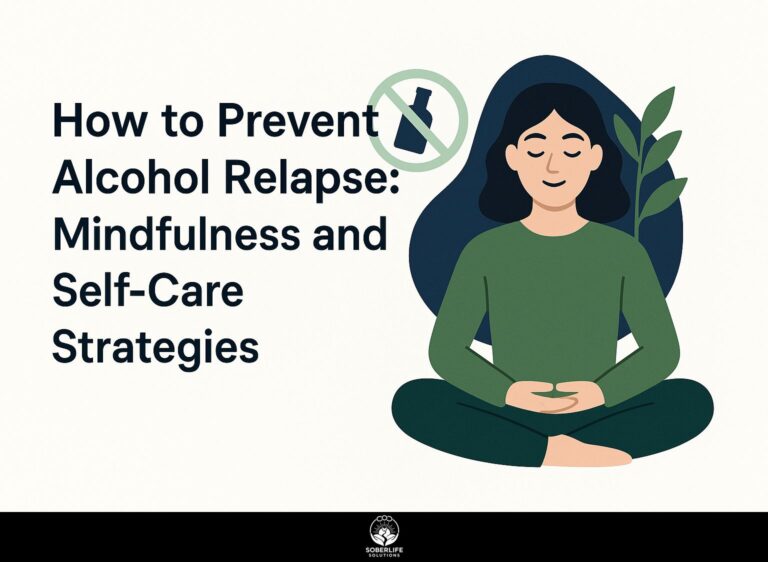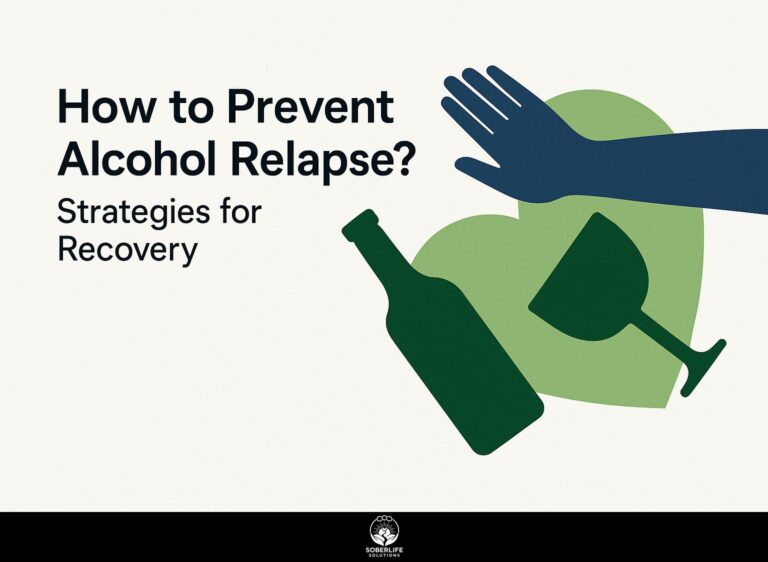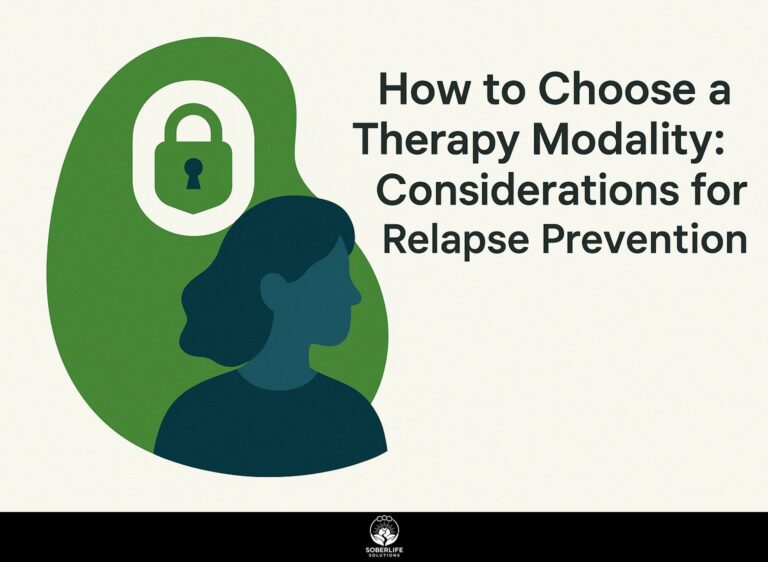Recovery Coaching: Benefits and Impact on Recovery
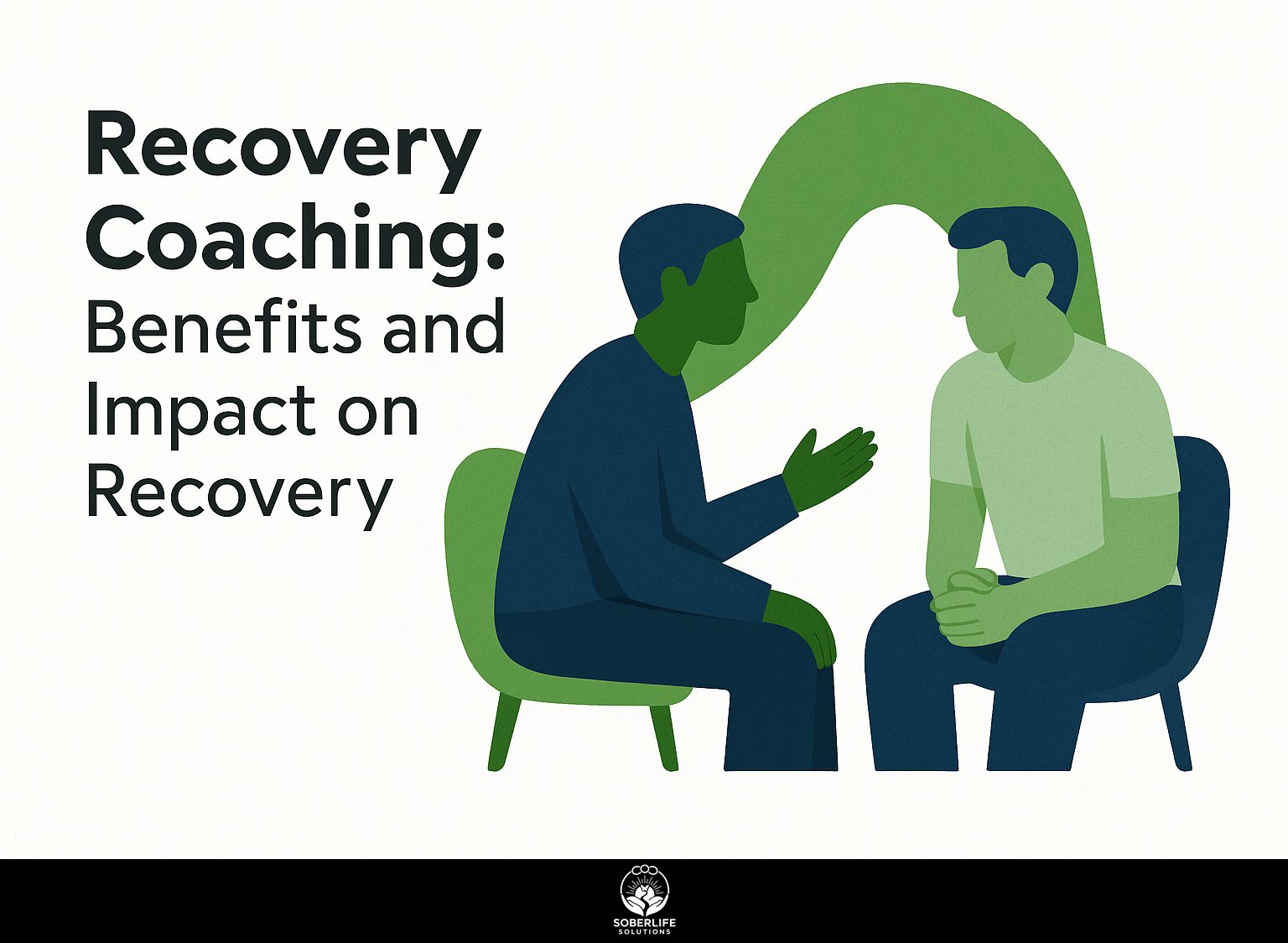
Recovery coaching is important in helping communities recover, providing necessary support for people dealing with alcohol and drug problems. With personalized help, including in recovery high schools, individuals can build strength and form relationships. This article looks at the benefits of recovery coaching, including personal support and better ways to handle challenges, showing its strong effect on long-term recovery results. Learn how recovery coaching can change lives and support a healthier tomorrow.
Key Takeaways:
Definition and Purpose
Recovery coaching involves trained coaches with similar experiences helping individuals achieve their recovery goals through customized plans.
These coaches share their own life experiences to build genuine connections, allowing clients to feel at ease when talking about their issues.
Recovery plans often contain practical steps like going to support groups, setting daily goals, or coming up with ways to handle cravings.
For instance, a recovery coach might help a client establish a weekly schedule that allocates time for therapy, exercise, and social activities, all of which reinforce positive behaviors.
This customized approach helps people progress and builds a strong foundation for long-term recovery. Some valuable insights into the role of peer support in recovery can be found in the resources provided by the Substance Abuse and Mental Health Services Administration (SAMHSA).
Historical Context
Recovery coaching started in the 1990s, growing out of early recovery programs that focused on community support and peer involvement.
Studies over the years have found that recovery coaching greatly improves results for those overcoming addiction. For example, studies indicate that individuals with recovery coaches experience higher retention rates in treatment and greater overall stability.
Key developments include the establishment of formal training programs and certification processes, such as those by the International Coach Federation.
Community resources such as support groups and recovery centers now include recovery coaching in their programs, promoting a more complete method for long-term recovery. (as highlighted in a recent publication by Mass.gov.)
Benefits of Recovery Coaching
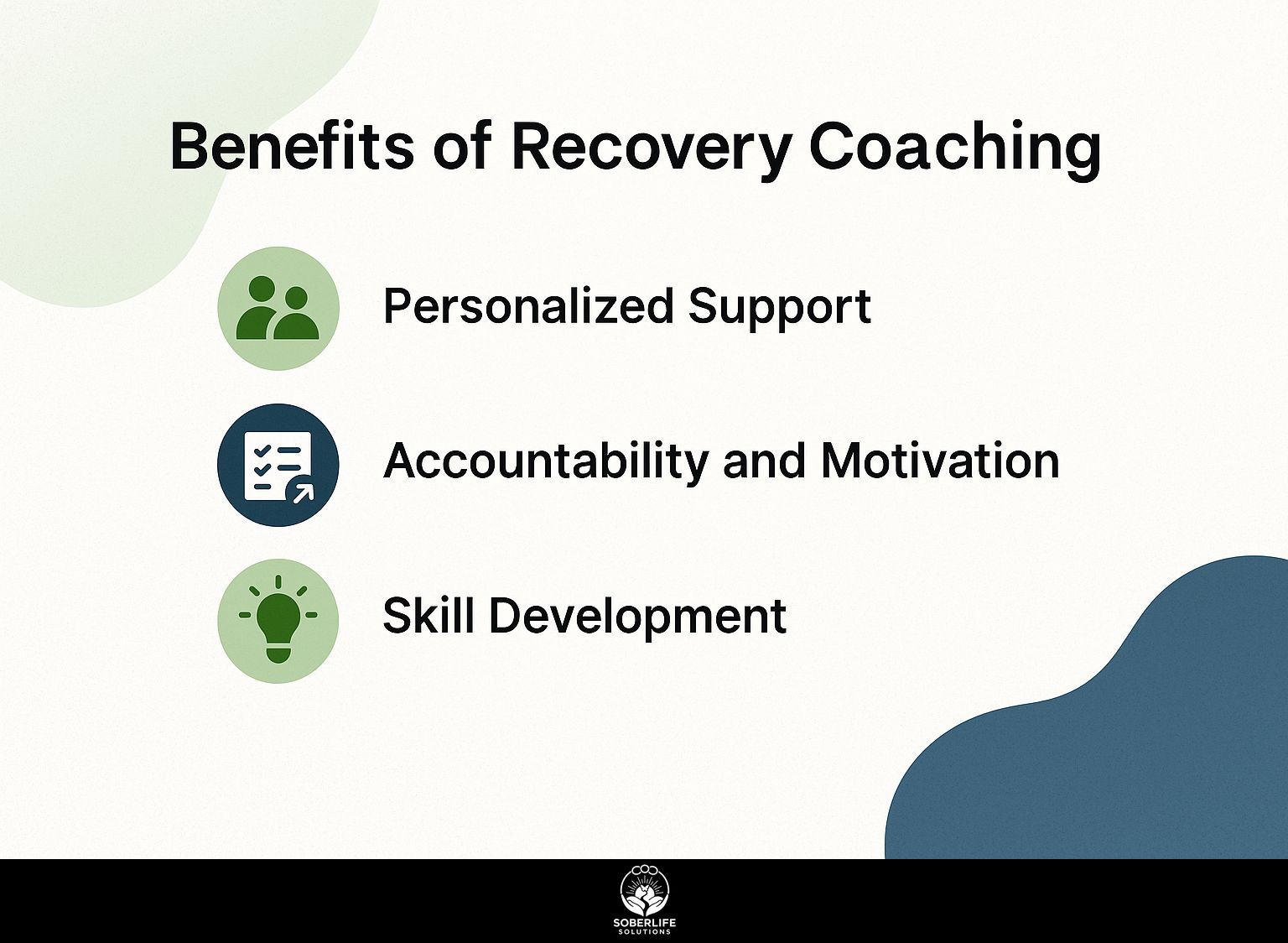
Recovery coaching provides many benefits, greatly improving recovery by offering organized help and skill building. (To enhance these efforts, our guide on building a support network offers insightful strategies.)
Personalized Support
Customized guidance is important in recovery coaching because it adjusts methods to fit each person’s specific needs and circumstances.
Recovery coaches often use tools like the Addiction Severity Index (ASI) from Boston University to identify specific needs in areas such as drug and alcohol use, mental health, and social support.
Based on the assessment results, coaches develop customized recovery plans that include actionable steps, like attending support meetings or engaging in wellness activities.
Regular check-ins help adjust these plans; for example, if a client struggles with anxiety, coaches may include mindfulness practices.
This method can be changed to suit different situations, helping maintain a steady way to health.
Accountability and Motivation
Accountability mechanisms in recovery coaching help maintain motivation and prevent relapse by encouraging individuals to adhere to their recovery goals.
One effective method is regular check-ins, which can be done weekly via phone or in-person meetings.
During these sessions, coaches review each client’s progress using tools like SMART goals to make sure the goals are clear, measurable, possible to achieve, important, and have a deadline.
Websites like Habitica or Asana are useful for keeping up with tasks and creating alerts. Setting realistic short-term goals, like going to a specific number of support meetings each month, gives clients confidence and helps them feel successful, strengthening their dedication to recovery.
Skill Development
Recovery coaching focuses on building skills, giving people the necessary life skills to handle recovery problems successfully.
Important skills gained from recovery coaching include:
- Controlling emotions, which helps people recognize and handle their feelings;
- Deciding, which helps in making good choices when situations are difficult;
- Managing stress, which offers ways to handle daily problems through low-stress job options available during recovery.
Workshops like “Emotional Intelligence Training” focus on recognizing and expressing emotions constructively. In contrast, “Decision-Making Strategies” sessions provide ways to evaluate options and make informed decisions.
These practical skills help people recover and handle daily challenges with more strength.
Impact on Recovery Outcomes
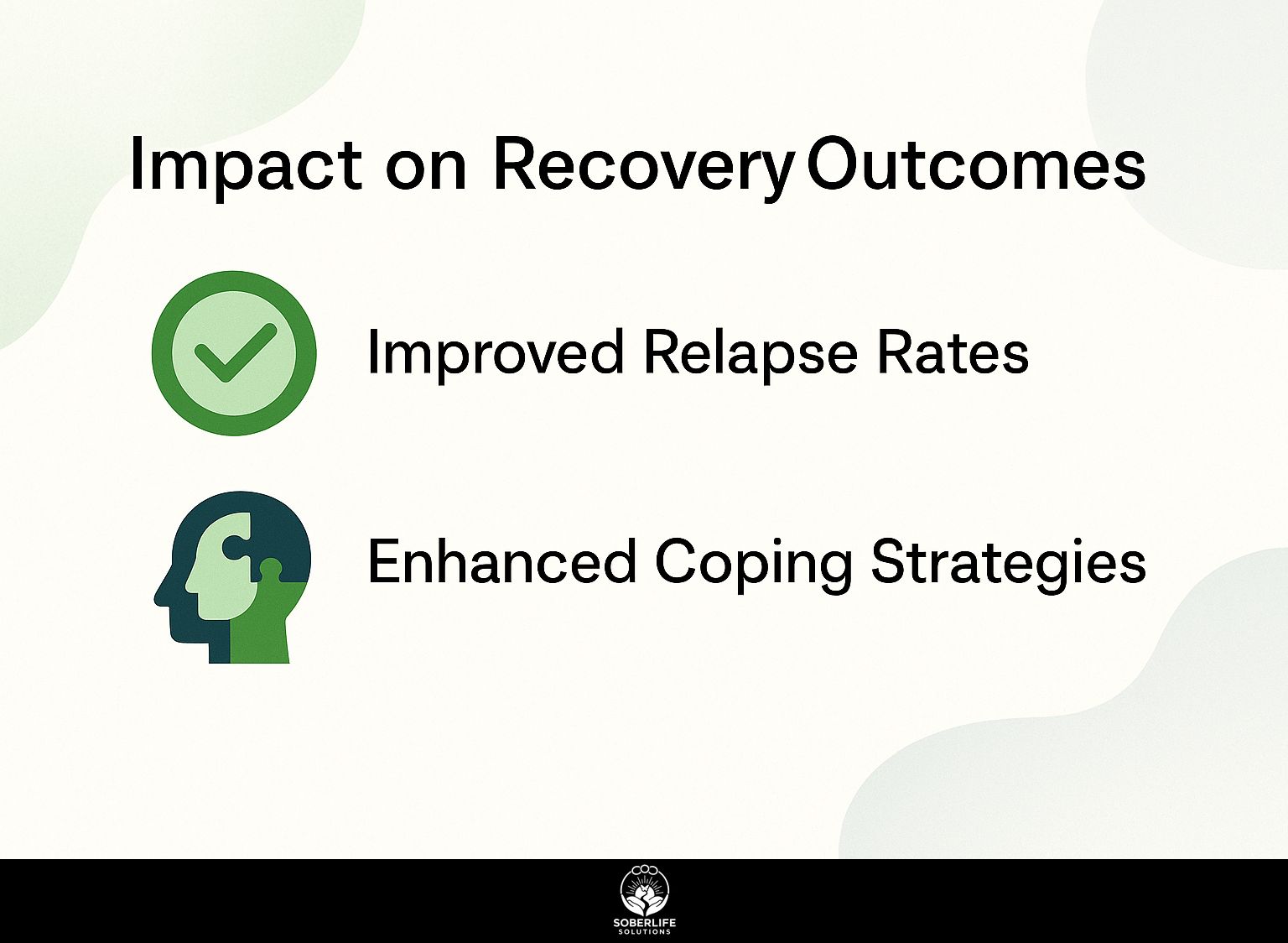
Good recovery coaching greatly improves recovery results by significantly lowering relapse rates and improving coping methods for people.
Improved Relapse Rates
Studies indicate that individuals engaged in recovery coaching experience up to a 30% decrease in relapse rates compared to those without such support.
One study found that clients who worked with certified recovery coaches maintained a sobriety rate of over 70% after one year, compared to 40% among those without coaching.
Methods like motivational interviewing and setting individual goals work well in this coaching. Feedback from participants shows that having a dedicated coach offers accountability and helps create ways to deal with triggers.
Many clients say they feel stronger and less alone, which plays a big part in their success in recovery.
Enhanced Coping Strategies
Recovery coaches provide people with better ways to handle stress, which are essential for dealing with difficulties related to overcoming addiction.
These strategies often include mindfulness practices, effective stress management techniques, and engagement in peer support networks.
One client used mindfulness meditation to help manage anxiety during cravings, resulting in significant progress in controlling emotions. Another found success by joining a local support group. This group offered encouragement and helped them stay accountable.
Recovery coaches typically guide individuals to tailor these strategies to their unique situations, ensuring their approach is both practical and sustainable. This individual focus greatly strengthens clients’ ability to recover.
Approaches and Techniques in Recovery Coaching
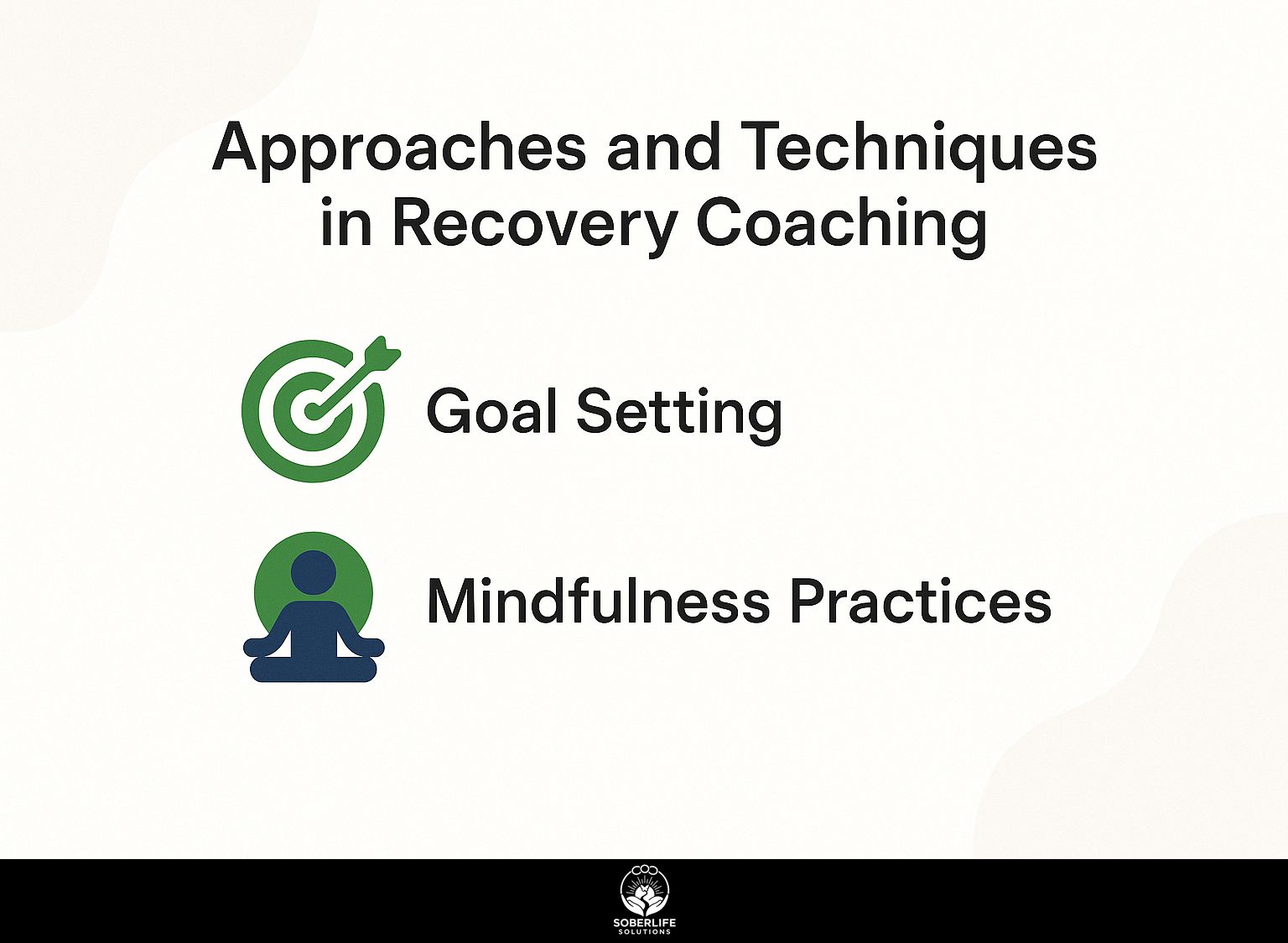
Recovery coaching uses various methods like setting goals and mindfulness exercises to help people in their recovery process. Additionally, incorporating life skills into addiction recovery can significantly enhance the effectiveness of these methods, as outlined in our insights on planning and developing life skills for addiction recovery.
Goal Setting
Goal setting is a critical technique in recovery coaching, helping individuals define clear, achievable objectives that guide their recovery process.
Here are some examples of objectives for recovery coaching using the SMART criteria:
- Specific goals could include attending a weekly support group meeting.
- Measurable objectives might involve tracking sobriety days or counting the number of coping strategies practiced each week.
- Achievable targets could focus on engaging in a new healthy hobby twice a month, while relevant goals should align with broader life improvements, like rebuilding relationships.
- Set a deadline, like planning for five therapy sessions in the next two months, to stay responsible and driven.
Mindfulness Practices
Using mindfulness in recovery coaching helps people control their emotions and encourages positive behavior changes.
Concretely, techniques such as meditation, deep breathing exercises, and journaling can be integrated into coaching sessions. For instance, a 10-minute guided meditation can help clients center themselves before discussing challenging topics.
Breathing exercises, like the 4-7-8 technique, can reduce anxiety in moments of stress. Journaling promotes self-reflection, allowing individuals to track their emotions and progress.
Research indicates that these techniques can improve how people manage stress and build emotional resilience, making them useful in recovery coaching.
Challenges in Recovery Coaching
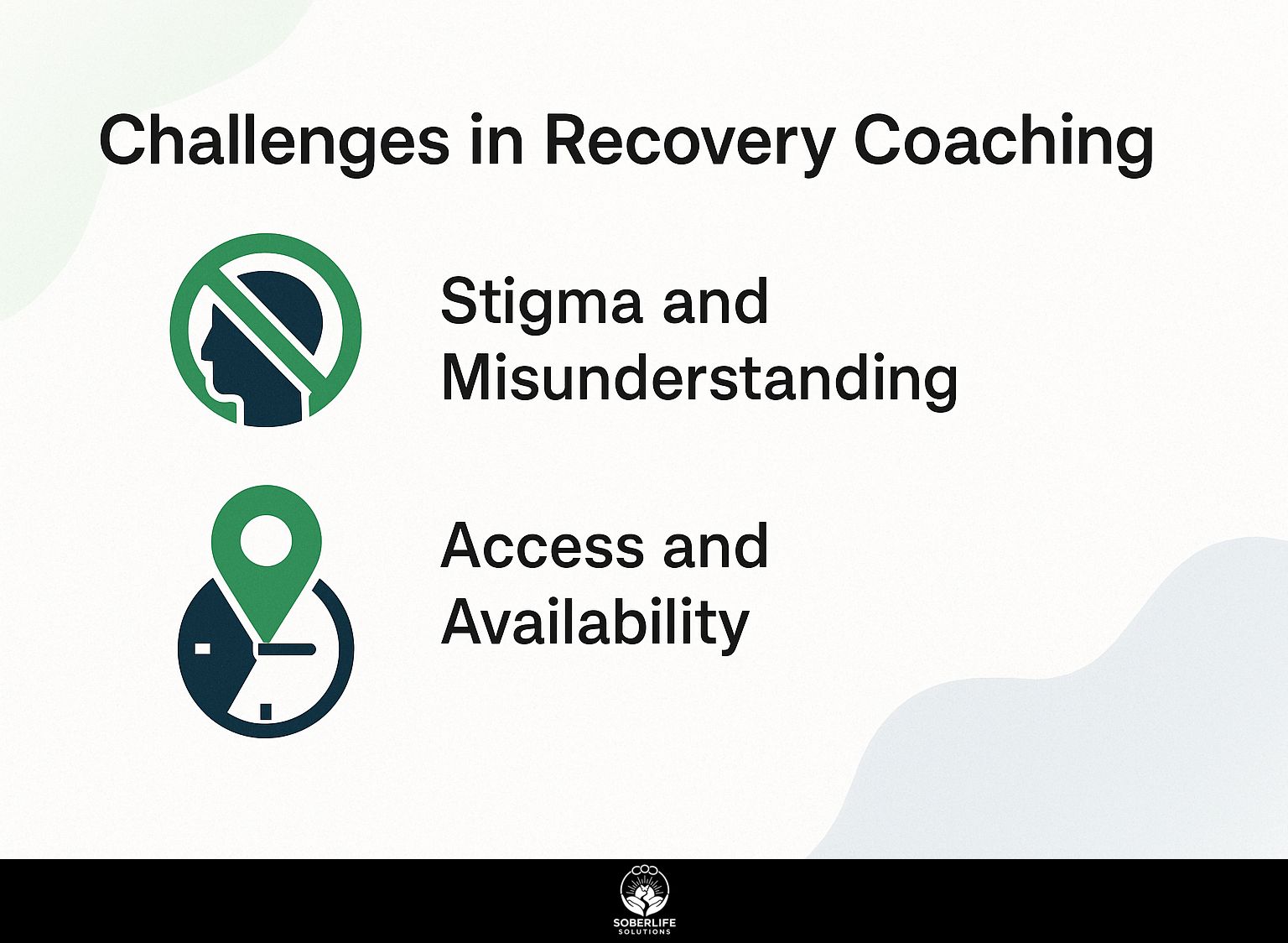
Although recovery coaching is helpful, it has some problems that can make it less effective and harder for people who need help to access it. Finding the right support group can significantly alleviate these issues, providing individuals with the necessary community and guidance. For those uncertain about where to start, here are key tips for choosing a support group.
Stigma and Misunderstanding
Prejudice about addiction and recovery coaching can cause confusion and hesitance in asking for help, which affects the availability of recovery support.
For instance, a study highlighted a young woman who hesitated to contact a recovery coach due to fear of judgment from her peers. Despite knowing the potential benefits, she avoided support, believing it a sign of weakness.
This typical situation shows how stigma can lead to isolation. On the other hand, peer-led programs that promote honest discussions about recovery often motivate individuals to ask for help.
Social media platforms and community workshops can reduce stigma, making conversations about addiction more frequent and encouraging more people to try recovery coaching services.
Access and Availability
Access to recovery coaching remains uneven, with many individuals unable to find local recovery community centers or qualified recovery coaches.
Geographical limitations pose a major barrier, particularly in rural areas where such resources are scarce. Financial constraints can further exacerbate this issue, as many coaching programs lack affordable options or are not covered by insurance.
To close this gap, people can use online recovery coaching platforms like BetterHelp or Noomii, which connect them with certified professionals no matter where they are.
Creating peer support groups can improve community-based recovery. This approach allows members to share resources and experiences in an environment that is more flexible and supportive.
Frequently Asked Questions
What is recovery coaching and what are its benefits?
Recovery coaching is a form of support for individuals in addiction recovery. It involves a trained professional who provides one-on-one guidance and accountability to help individuals stay on track with their recovery goals. The benefits of recovery coaching include increased motivation, improved coping skills, and a sense of accountability and support.
How does recovery coaching affect a person’s path to recovery?
Recovery coaching can greatly influence a person’s path to recovery. It offers a supportive and accepting environment, along with practical tools and techniques to help people overcome difficulties and sustain long-term recovery.
What makes recovery coaching different from traditional therapy?
Recovery coaching is not the same as traditional therapy because it focuses on what’s happening now and what you want to achieve, rather than looking back at past experiences. Recovery coaching is also more action-oriented and involves setting and achieving specific recovery goals with the support of a coach.
Who can benefit from recovery coaching?
Anyone in addiction recovery can benefit from recovery coaching. This includes people who are beginning their recovery process, as well as those who have been recovering for a while but need more help and advice.
How can recovery coaching help with relapse prevention?
Recovery coaching is highly effective in preventing relapse. Recovery coaches provide personalized support and useful tools to help people manage triggers and cravings, assisting them in following their recovery plans and preventing relapse.
Is recovery coaching a long-term commitment?
The length of time an individual works with a recovery coach may vary depending on their needs and goals. Some individuals may benefit from short-term coaching, while others may choose to continue with coaching as part of their long-term recovery plan. Recovery coaching is a flexible and personalized support system that can adjust to a person’s changing needs and goals.

